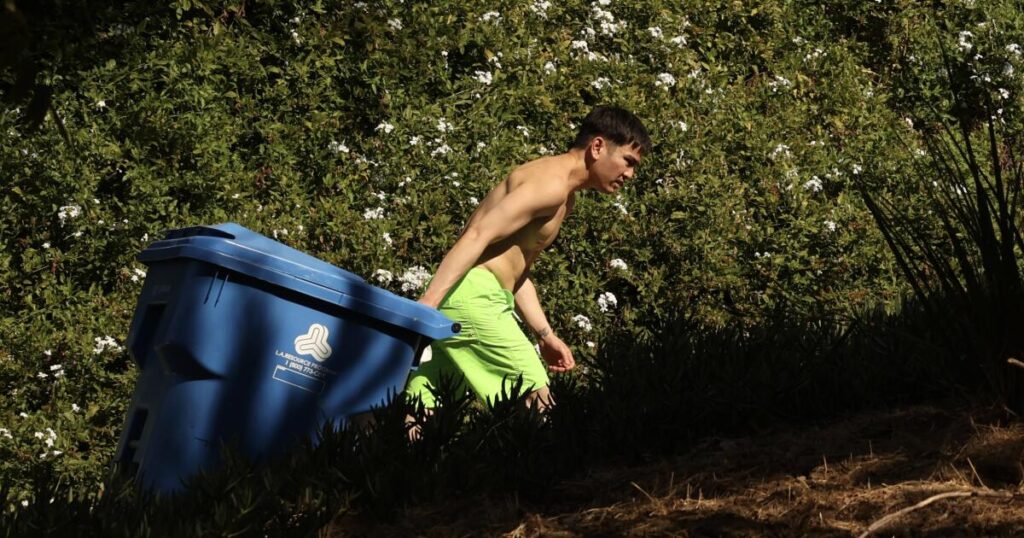Faced with a nearly $1-billion budget shortfall, Los Angeles elected officials are returning to a tried-and-true formula for weathering difficult financial times: charging more for city services.
On Wednesday, two City Council committees — one focused on public works, the other on environmental issues — endorsed a plan to increase trash pickup fees in each of the next five years, with the first hike being the largest by far.
Under the plan, refuse collection fees would go up for an estimated 740,000 customers in single-family homes, duplexes and apartment buildings with three or four units. Those customers put their waste in black, blue and green bins, which are emptied by city workers once a week.
The monthly trash fee for single-family homes and duplexes would go up 54% in the coming budget year, reaching $55.95, up from $36.32. The monthly fee for smaller apartment buildings — those with three or four units — would be increased to $55.95, up from $24.33.
The trash fee proposal heads to the full City Council for a vote Friday. If the plan is approved, city lawyers would draft an ordinance establishing the higher rates, which would also require council approval.
Wednesday’s committee votes came as city leaders, looking to erase the massive budget shortfall, are weighing whether to eliminate thousands of city jobs. Mayor Karen Bass is scheduled to release her budget, and her plan for closing the financial gap, on April 21.
Councilmember Katy Yaroslavsky, who heads the council’s budget committee, and Council President Marqueece Harris-Dawson recently called for city policy analysts to find new opportunities for generating revenue, such as setting fees at “appropriate levels to achieve cost recovery.”
Officials with the city’s Bureau of Sanitation said the existing trash fees have not been generating enough money to cover the true cost of refuse collection. The general fund budget, which pays for public safety and other basic services, has been making up the difference, they said.
If the rates aren’t increased, the general fund will be forced to absorb more than $200 million of those costs in the next budget year, which starts July 1, sanitation officials said.
“That’s a game changer when we’re trying to think about how many [city] jobs we’re trying to protect,” Councilmember Eunisses Hernandez, who represents parts of the city’s Eastside, said at Wednesday’s joint committee meeting.
Yaroslavsky agreed, saying that charging less than the true cost of trash collection is “bad budgeting, especially as we stare down a billion-dollar deficit.”
“It’s absolutely necessary that we do this,” she said.
Councilmember Adrin Nazarian cast the lone opposing vote, saying he was concerned that city officials had waited too long to raise the rates. Nazarian proposed that the council schedule a study to reassess those rates in 2028 — an idea rejected by his colleagues.
The first round of rate increases is expected to generate more than $200 million over a full calendar year, according to City Administrative Officer Matt Szabo, the city’s top budget analyst.
If the rate hikes go into effect by Oct. 1, the sanitation bureau probably will generate an additional $90 million during the coming fiscal year. If the increases go into effect on Jan. 1, they would produce an extra $49 million, officials said.
Under the city’s proposal, trash fees would continue going up through 2029. In the final year, single-family homes and apartments with two to four units would be charged $65.93 per month for refuse collection.
For single-family homes and duplexes, that would represent an 81% increase over the current year. For apartments with three or four units, the fee would nearly triple. Larger apartment buildings would not be covered by the planned trash fee hikes.
The increases would show up on the bills issued on a bimonthly basis by the Department of Water and Power, under the line item “solid resource fee.”
The sanitation bureau is also seeking to increase the fee for the removal of bulky items, such as mattresses or couches, and plans to increase the number of customers who are charged that fee.
Sanitation officials said their agency needs the increases to absorb rising equipment costs, higher salaries and an expensive new organic waste program.
Szabo said the sanitation bureau is spending tens of millions of dollars on compliance with California Senate Bill 1383, which requires the diversion of organic waste away from landfills.
“The state doesn’t allow us to throw food in the trash anymore, and that’s going to cost a lot more money,” he said.
The last time the council hiked trash fees was 17 years ago, when Antonio Villaraigosa was mayor. During his first term, Villaraigosa succeeded in tripling customers’ bills over a three-year period.
In 2006, Villaraigosa said the fee increases were needed to cover his plan to hire 1,000 police officers. By 2008, the additional funds were also needed to help the city weather a budget crisis sparked by the 2008 global recession.
On Wednesday, several council members demanded to know why the city waited so long to seek trash fee increases. Sarai Bhaga, the sanitation bureau’s chief financial officer, told them that a rate hike had been discussed around 2017 and 2018, but “the political headwinds didn’t support it at that time.” Once the COVID-19 pandemic started, the idea was again delayed, she said.
Jack Humphreville, who volunteers with Neighborhood Council Budget Advocates, a watchdog organization, accused council members of pushing the fee proposal through without sufficient time for the public to weigh in.
The agenda for Wednesday’s committee meeting was posted just a day earlier, he said. Only one person testified during the meeting.
“Everything’s at the last moment,” Humphreville said. “There’s just been no outreach, no transparency, no nothing.”
